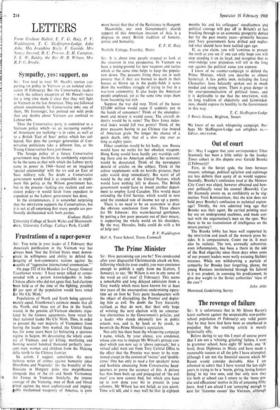Sympathy, yes: support, no
LETTERS
From Graham Hallett, E. F. G. Haig, P. V. Waddington, T. C. Skeffington-Lodge, John Ashe, Mrs Josephine Boyle, F. Garside, Mrs Nancy Inwood, R. C. Proctor, E. H. Cain pion. T. E. W. Baldry, the Rev H. R. Wilson, Mrs R. P. G. Brodie.
Sir: You tend to treat Mr Heath's motion sup- porting us policy in Vietnam as an isolated aber- ration (9 February). But the Conservative leaders —with the solitary exception of Mr Powell—have for a long time made it clear that they will fight in Vietnam to the last American. They are followed almost unanimously by Conservative MPS; one of them, Mr Iremonger, has pointed out with pride that any doubts about Vietnam are confined to Labour MPS.
Thus the Conservative party is committed to a Vietnam policy which—as an increasing number of Americans are realising—is in ruins, as well as to a British 'East of Suez' policy which has col- lapsed. Nor does the younger generation of Con- servative politicians take a different line, as the Young Conservatives have just shown.
The foreign policy of a future Conservative government may therefore be confidently expected to be the same as that with which the Labour party came to power in 1964—based on an imagined 'special relationship' with the us and an East of Suez military role. No doubt a Conservative government would find it as impossible to imple- ment this policy as the Wilson government has, but in the process—lacking any realistic and con- sistent policy—it would lurch from expedient to expedient as the Labour government has done.
In the circumstances, it is somewhat surprising that the SPECTATOR supports the Conservatives, but it is not at all surprising that many people are pro- foundly disillusioned with both parties.
Graham Hallett University College of South Wales and Monmouth- shire, University College, Cathays Park, Cardiff


































 Previous page
Previous page